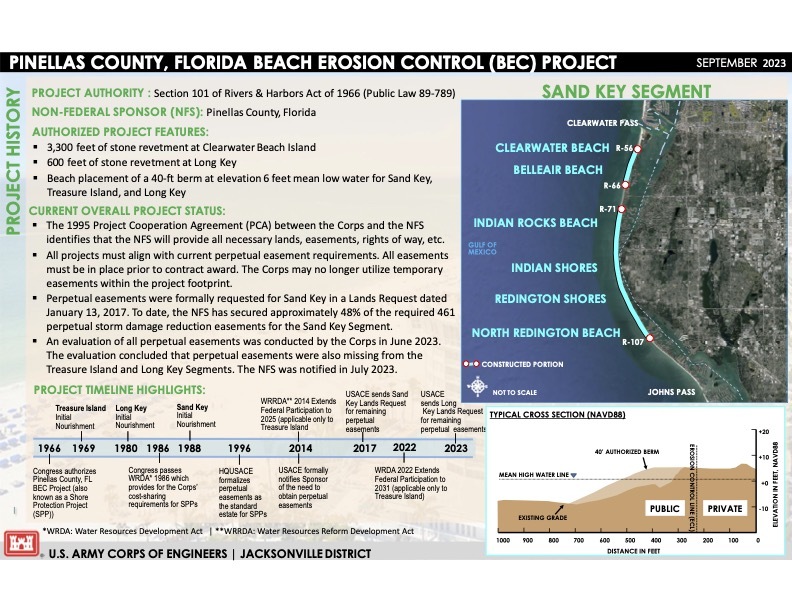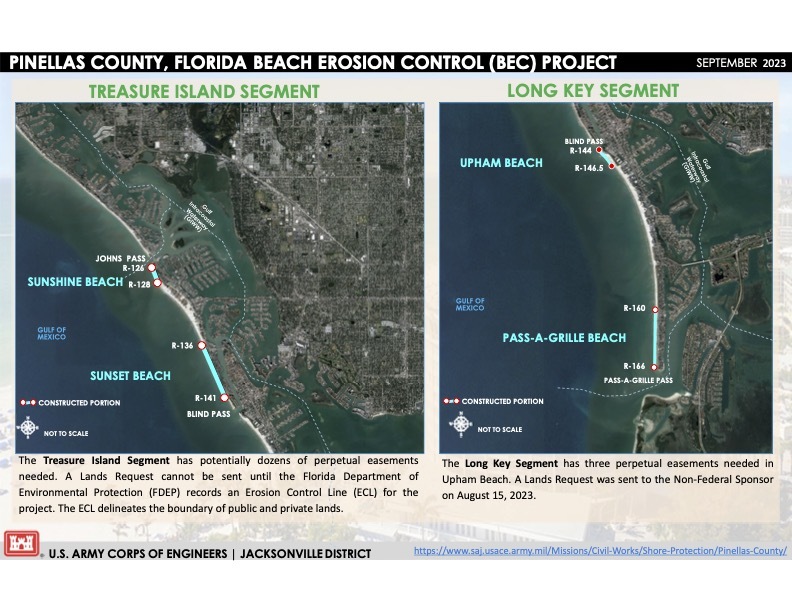Yesterday at Indian Shores Townhall the Army Corps of Engineers (ACE) briefed the status of the Beach Erosion Control Project (beach nourishment). ACE Jacksonville District Commander Col. James Booth and his staff made a professional presentation of this project that concerns us all in Pinellas County.
The Bottom Line: ACE will not deviate from their policy of 100% compliance with securing perpetual easements of private lands in which to perform beach nourishment. Example: Three properties in the Long Key segment of the project have declined to sign a perpetual easement therefore ACE will not perform nourishment of Long Key. There are many others in Sand Key and Treasure Island who have also declined.
Elected officials were given the first opportunity for comments and questions. County Commissioner Kathleen Peters made an excellent point in her comments highlighting contradicting Army Corps policies. There is a policy that requires flexibility from the Corps.
"It states in the policy the Corps should not have rigid policies that affect the people, the environment, and the economy," Peters said. "I'm interpreting this as very rigid given these have been waived before..."
County Commissioner Rene Flowers connected with residents when she said the solution to gleaning 100% signatures is addressing the policy language "perpetual" and "public access." She commented that changing policies is something that happens all the time, and sitting down to carve clear and specific language should be a priority in moving forward in good faith.
State Representative Linda Chaney stated, "We toured the beaches, we saw the destruction, and I can't express the disappointment we have that your conclusion after seeing that destruction is to say, 'Give us your property or don't get sand.' My question as a State representative is how does the federal government take state money from our taxpayers that is supposed to provide us with a service as a state, and not provide that service? What law, what statute, gives you the authority to take our funds and not provide a service?"
In response to this pointed question, Col. Booth responded, "The federal government does not take property. These easements give us access to property." He then continued by stating he believed that while our local funds are allocated to this project, our funds have not yet been fully billed and received and would not be until completion of the project.
These comments highlighted two fundamental disagreements between local residents, their representatives, and the Corps.
First, the language of the easements is, on its face, incredibly broad -- they are "perpetual public easements". While Col. Booth's response is stating they just need "access" to the property, in reality, property owners understand that granting a perpetual public easement based upon lines drawn decades ago is in actuality taking a significant portion of their property completely out of their control. Of course, landowners would still be paying taxes on that property despite having ceded control of it through the easement.
Second, Col. Booth could not speak to the broader question of why we send so much money to Washington, DC, and yet find ourselves completely disempowered to defend our coastline and community.
Matthew McConnell, Assistant City Attorney for St. Pete Beach, followed up with critical related questions. First, concerning the easement areas behind Upham Beach, he asked if the USACE could explain how they were calculated: "I've seen the diagram and the easements, and not only do they go way landward of the ECL [Erosion Control Line] they also abut the current pool behind the [Silver Sands] condo. I don't understand how that area would ever be used for renourishment without destroying structures that are currently there."
One of Col. Booth's teammates replied, "The lines are based on what we have previously constructed. So in that particular spot, that's from a 2004 renourishment."
This question highlighted another fundamental disagreement -- using boundaries that do not reflect current realities result in property owners being asked to cede control of property that has nothing to do with the current need for beach renourishment.
Mr. McConnell's final question clearly defined the current standoff: "Not to be negative, but if we never come into compliance with the policy does that mean that the federal government will never help us with beach nourishment?"
Col. Booth replied, "If we don't get policy compliant easements, no, we will not come back in unless it is 100% on each segment."
"If we don't get policy compliant easements, no, we will not come back in unless it is 100% on each segment."
St. Pete Beach mayor Adrian Patrila asked a related question, what has changed in the past two months that there is no longer flexibility to look at the renourishment project parcel-by-parcel? Col. Booth responded that the policy had not changed, it is just now being enforced.
During the public comment portion of the meeting, residents who own beach front properties in Pinellas County that have declined to sign easements cited their objections and concerns to signing a perpetual public easement stemmed from the language "perpetual" and "public access" granting anyone access at anytime for any reason.
Col. Booth and his team listened, took notes and responded to concerns. Booth said, “I really appreciated hearing from the public about the concerns of the language that’s in the perpetual easement. A lot of folks are concerned about the public access comments that are in there and the terminology of perpetual.”
If the standoff continues and the county decided to use county funds, ACE stated that nourishment plans would be approved by ACE. However, the use of county funds to renourish comes at a very high price: Pinellas County would then be ineligible for FEMA 100% financing of beach restoration in cases of future storms and natural disasters, and ACE would not use Federal funds for nourishment in the future.
This final comment is particularly stark in light of recent damage by Hurricane Idalia. As noted by St. Pete Beach City Manager Alex Rey, there is no dune system and no protection left at Pass-a-Grille beach.

